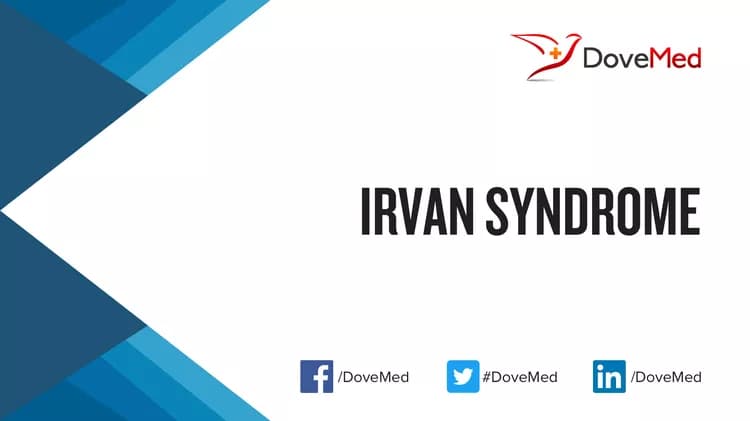What are the other Names for this Condition? (Also known as/Synonyms)
- Idiopathic Retinal Vasculitis-Aneurysms-Neuroretinitis Syndrome
- Idiopathic Retinal-Aneurysms-Neuroretinitis Syndrome
What is IRVAN Syndrome? (Definition/Background Information)
- IRVAN Syndrome is an acronym for "Idiopathic Retinal Vasculitis-Aneurysms-Neuroretinitis Syndrome," a condition that primarily affects the eyes
- Although this condition can occur in people of all ages, it is most commonly diagnosed in the third or fourth decade of life
- The severity of the condition varies from person to person with some affected people experiencing a mild form that resolves on its own and others experiencing a severe form that may progress to vitreous hemorrhage (leakage of blood into the eye), vision loss and/or glaucoma
- The underlying cause of IRVAN Syndrome is currently unknown. Most cases occur sporadically in people with no family history of the condition
- Treatment varies based on the severity of the condition and the associated signs and symptoms. In severe cases, surgery or medications such as corticosteroids may be recommended for IRVAN Syndrome
(Source: IRVAN Syndrome; Genetic and Rare Disease Information Center (GARD) of National Center for Advancing Translational Science (NCATS), USA.)
Who gets IRVAN Syndrome? (Age and Sex Distribution)
- IRVAN Syndrome is a rare congenital disorder estimated to occur at less than 1 in a million
- The presentation of symptoms may occur at any age, although the most common age at presentation is in the 3rd-4th decades of life (between age 20 and 40 years)
- Both males and females may be affected
- Worldwide, individuals of all racial and ethnic groups may be affected
What are the Risk Factors for IRVAN Syndrome? (Predisposing Factors)
- Currently, no risk factors have been clearly identified for IRVAN Syndrome
It is important to note that having a risk factor does not mean that one will get the condition. A risk factor increases one’s chances of getting a condition compared to an individual without the risk factors. Some risk factors are more important than others.
Also, not having a risk factor does not mean that an individual will not get the condition. It is always important to discuss the effect of risk factors with your healthcare provider.
What are the Causes of IRVAN Syndrome? (Etiology)
- At the present time, the exact cause of IRVAN Syndrome is not known
- Most cases are develop sporadically with no known family history of the condition
What are the Signs and Symptoms of IRVAN Syndrome?
The signs and symptoms of IRVAN Syndrome may vary among affected individuals in type and severity.
Based on the frequency of symptoms observed, the following information may be noted:
- Blurred vision
- Increased intraocular pressure
- Macular edema
- Optic atrophy
- Photophobia
- Reduced visual acuity
- Retinal exudate
- Tractional retinal detachment
- Vitreous floaters
(Source: IRVAN Syndrome; Genetic and Rare Disease Information Center (GARD) of National Center for Advancing Translational Science (NCATS), USA.)
How is IRVAN Syndrome Diagnosed?
IRVAN Syndrome is diagnosed on the basis of the following information:
- Complete physical examination
- Thorough medical history evaluation
- Assessment of signs and symptoms
- Laboratory tests
- Eye and vision acuity examinations
- Imaging studies
- Biopsy studies, if necessary
Many clinical conditions may have similar signs and symptoms. Your healthcare provider may perform additional tests to rule out other clinical conditions to arrive at a definitive diagnosis.
What are the possible Complications of IRVAN Syndrome?
The complications of IRVAN Syndrome may include:
- Glaucoma
- Bleeding inside the eye
- Blindness
Complications may occur with or without treatment, and in some cases, due to treatment also.
How is IRVAN Syndrome Treated?
There is no cure for IRVAN Syndrome, since it is a genetic condition. The treatment is usually given to manage the signs and symptoms and any complication that develops. Such treatment methods may include the administration of medications, such as corticosteroids, and surgical repair.
How can IRVAN Syndrome be Prevented?
- At the present time, no preventive methods or guidelines are available for IRVAN Syndrome, since the cause of this condition is not known
- Active research is currently being performed to explore the possibilities for treatment and prevention of disorders such as IRVAN Syndrome
- Regular medical screening at periodic intervals with tests and physical examinations are recommended
What is the Prognosis of IRVAN Syndrome? (Outcomes/Resolutions)
- The prognosis of IRVAN Syndrome is dependent upon the severity of the signs and symptoms and associated complications, if any
- Individuals with mild conditions have better prognosis than those with severe symptoms and complications
- Typically, the prognosis may be assessed on a case-by-case basis
Additional and Relevant Useful Information for IRVAN Syndrome:
The following DoveMed website link is a useful resource for additional information:
Related Articles
Test Your Knowledge
Asked by users
Related Centers
Related Specialties
Related Physicians
Related Procedures
Related Resources
Join DoveHubs
and connect with fellow professionals


0 Comments
Please log in to post a comment.